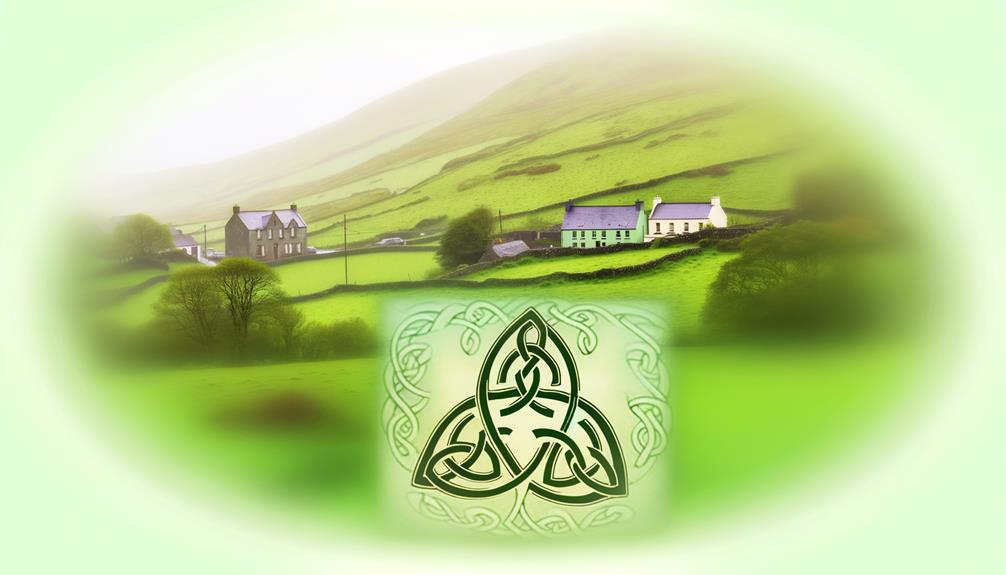Sean Name Meaning and Origin
The name Sean originates from the Irish name Seán, which derives from the French Jean and ultimately the Hebrew Yohanan, meaning 'God is gracious.' Prominent in Medieval Ireland, it symbolizes the Christianization of Gaelic culture. Linguistically, it traveled through Latin and Greek adaptations before establishing in Gaelic.
The name Sean reflects deep religious and cultural exchanges, evolving into its modern form through phonetic and orthographic changes. Today, it carries significant cultural pride and has notable variants such as Shaun and Juan.
This historical narrative enriches our understanding of its widespread and enduring appeal. For more nuances on this evolution, stay engaged.

Key Takeaways
- Sean is derived from the Irish name 'Seán,' which means 'God is gracious.'
- The name Sean has roots in the Hebrew name 'Yohanan.'
- Sean emerged prominently in Ireland during the Middle Ages.
- The name Sean reflects the Christianization of Gaelic culture.
- Sean has significant cultural importance and is commonly used today.
Historical Background
Derived from the Irish name 'Seán,' which itself is a form of the Old French name 'Jean,' the name Sean has roots extending back to the Hebrew name 'Yohanan,' meaning 'God is gracious.'
Historically, the name Sean emerged prominently in Ireland during the Middle Ages, a period marked by the Christianization of the Gaelic culture. The widespread adoption of Sean can be attributed to the influence of saints, particularly Saint John the Baptist and Saint John the Apostle, whose veneration spread through the efforts of early missionaries.
The name subsequently permeated various strata of Irish society, symbolizing devoutness and piety. Over centuries, Sean evolved into a common yet esteemed name, reflecting a blend of religious reverence and cultural identity.
Etymology
The name Sean, rooted in the Gaelic language, is a variant of the Hebrew name Yohanan, meaning 'God is gracious.'
Tracing its historical evolution, the name evolved through various cultural adaptations, solidifying its presence in Irish tradition.
Today, Sean holds significant cultural importance, reflecting both its ancient origins and contemporary usage.
Gaelic Language Roots
How did the name Sean originate within the Gaelic language, and what historical influences shaped its evolution?
The name Sean is a Gaelic adaptation of the Hebrew name Yochanan, meaning 'God is gracious.' It entered the Gaelic lexicon through the Latin form Johannes, which became Seán in Old Irish.
The transformation reflects the Christianization of Ireland, where biblical names were integrated into local traditions.
The phonetic adjustments from Latin to Gaelic were influenced by the linguistic characteristics of Old Irish, including its preference for softer consonant sounds.
This adaptation underscores how religious and cultural exchanges between Ireland and continental Europe played a pivotal role in shaping the Gaelic language, embedding Sean as a common and enduring given name.
Name's Historical Evolution
Examining the historical evolution of the name Sean reveals a complex interplay of linguistic transformations and cultural integrations that reflect broader historical trends.
Originating from the Hebrew name Yohanan, meaning 'God is gracious,' Sean evolved through Greek and Latin intermediaries—Ιωάννης (Ioannes) and Johannes, respectively—before entering the Gaelic linguistic sphere.
The name then transformed into Seán in Irish, reflecting phonetic and orthographic adaptations unique to the Gaelic language. This evolution illustrates the movement of cultural and religious influences across Europe.
Cultural Significance Today
Reflecting its rich historical evolution, the name Sean today carries significant cultural connotations, intertwining its etymological roots with contemporary identity and tradition. Originating from the Hebrew name Yochanan, meaning 'God is gracious,' Sean has traversed through centuries, becoming a staple in Irish nomenclature. The name's persistence highlights a blend of reverence for ancestral heritage and modern adaptability. Sean encapsulates a storied past while remaining relevant in today's multicultural context.
- Pride in Irish Ancestry: Sean evokes a sense of belonging and heritage.
- Timeless Appeal: Its usage endures across generations.
- Cultural Fusion: Reflects a harmonious blend of ancient and modern influences.
- Spiritual Resonance: Carries a profound, gracious meaning.
- Global Recognition: Universally acknowledged, transcending geographic boundaries.
Cultural Significance
The name Sean, derived from the Irish name Seán, holds profound cultural significance, particularly in Ireland where it is deeply embedded in the nation's linguistic and historical heritage.
Historically, Seán is the Irish equivalent of the English name John, rooted in the Hebrew Yochanan, meaning 'God is gracious.' This name has been prevalent since the medieval period, often borne by notable figures such as Seán O'Casey, a prominent playwright, and Seán MacBride, a Nobel Peace Prize laureate.
Its widespread use reflects a cultural assertion of Irish identity, especially during periods of English rule when Irish names were suppressed. Hence, the name Sean encapsulates a resilient cultural and historical narrative, symbolizing national pride and continuity.
Variations and Spellings
As the cultural significance of the name Sean is deeply rooted in Irish heritage, it is intriguing to explore its various spellings and adaptations across different regions and languages.
Historically, Sean is derived from the Gaelic name Seán, itself a translation of the Norman-French Jehan, which was introduced to Ireland after the Norman invasion. Over time, the name has evolved and diversified, reflecting the linguistic and cultural exchanges that have shaped its journey. Today, Sean is a popular name in many English-speaking countries and is often chosen for its traditional and timeless appeal. It is also seen as a reid name meaning “gift from God,” a fitting interpretation for a name with such a rich and varied history. Ultimately, Sean’s continued popularity and significance demonstrate its enduring place in the cultural tapestry of the world.
- Shawn: A common Anglicized version in the United States.
- Shaun: Popularized in English-speaking countries, often seen in the UK.
- Seán: The original Gaelic form, retaining its authentic accent.
- Jean: A French variant that shares the same etymological roots.
- John: The English equivalent, demonstrating the name's adaptability.
Famous Seans
Spanning various fields such as entertainment, sports, and politics, numerous individuals named Sean have achieved prominence, highlighting the name's enduring appeal and versatility. Historical analysis reveals a diverse array of influential Seans who have left indelible marks on their respective domains. Sean Connery, a legendary actor, is renowned for his iconic portrayal of James Bond. Sean Penn, an esteemed actor and director, has earned critical acclaim and multiple Academy Awards. In sports, Sean Taylor, a formidable NFL safety, is remembered for his outstanding contributions to American football. These notable Seans exemplify the name's widespread resonance and its capacity to inspire greatness.
| Field | Notable Sean | Achievement |
|---|---|---|
| Entertainment | Sean Connery | Iconic portrayal of James Bond |
| Film | Sean Penn | Multiple Academy Awards |
| Sports | Sean Taylor | Outstanding NFL safety |
Popularity Over Time
Examining the historical trajectory of the name Sean reveals its fluctuating popularity and enduring presence across different eras. Originating in Ireland, Sean gained notable traction during the mid-20th century, particularly in English-speaking countries.
The name's peak in the United States occurred in the 1970s, coinciding with the rise of several prominent figures bearing the name. Over the decades, Sean has experienced varying degrees of favor, reflecting cultural and societal shifts.
- 1950s-1960s: Emergence in popularity, particularly in the U.S.
- 1970s: Peak popularity, bolstered by celebrities.
- 1980s-1990s: Steady presence, though slightly declining.
- 2000s: Resurgence due to cultural nostalgia.
- 2010s-present: Moderate usage, maintaining a classic appeal.
This historical analysis underscores Sean's dynamic yet steadfast allure.
Modern Usage
In contemporary culture, the name Sean has maintained a steady presence, bolstered by its frequent appearance in media and entertainment, with notable figures such as Sean Connery and Sean Penn enhancing its visibility.
This name also exhibits significant global variation, manifesting as Seán in Ireland, Séan in Scotland, and Jean in France, each reflecting unique linguistic and cultural adaptations.
The sustained popularity of Sean and its variants underscores a broader trend of cultural interchange and the enduring appeal of traditional names in modern contexts.
Popularity in Pop Culture
Throughout recent decades, the name Sean has maintained a significant presence in pop culture, often attributed to its association with prominent figures in film, music, and literature. This persistent visibility has cemented Sean as a name both timeless and modern, evoking a sense of both tradition and contemporary relevance.
From iconic actors to legendary musicians, the name Sean has become synonymous with talent and charisma, influencing its popularity across generations.
- Sean Connery: The first actor to portray James Bond, leaving an indelible mark on cinematic history.
- Sean Penn: An Oscar-winning actor known for his intense performances and activism.
- Sean Combs: A titan in the music industry, also known as Puff Daddy.
- Sean Astin: Beloved for roles in 'The Goonies' and 'The Lord of the Rings'.
- Sean Parker: Co-founder of Napster and first president of Facebook, impacting technology and social media.
This ubiquitous presence underscores the name's enduring appeal and versatility.
Sean Variants Worldwide
While the name Sean has garnered acclaim through pop culture icons, its global reach is further evidenced by the myriad of variants that exist in different cultures and languages, each with its own unique adaptation and historical significance. The name's versatility is showcased in its various forms, reflecting regional linguistic nuances and historical contexts.
| Variant | Language | Historical Significance |
|---|---|---|
| Seán | Irish | Gaelic origin, traditional Irish spelling |
| Shaun | English | Popularized in English-speaking countries |
| Jean | French | Derived from the Old French 'Jehan' |
| Juan | Spanish | Rooted in the Latin 'Iohannes', widely prevalent |
These variants underscore the name's adaptability and enduring relevance, demonstrating how it has been embraced and transformed across different cultures and epochs.
Conclusion
The name Sean, with its rich historical background and etymology rooted in the Irish language, holds significant cultural importance.
Variations and spellings across regions reflect its widespread influence. The name's prominence, evidenced by famous bearers and its fluctuating popularity over time, underscores its enduring legacy.
Modern usage continues to evolve, but what does the persistence of such names reveal about cultural continuity and identity?
The name Sean remains a tribute to the enduring power of tradition.






